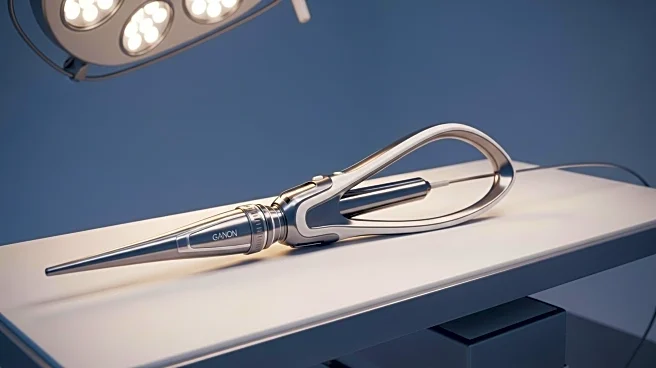What is the story about?
What's Happening?
Johnson & Johnson has introduced the Shockwave Javelin intravascular lithotripsy catheter in Europe, aimed at treating patients with peripheral artery disease. The device utilizes sound pressure waves to break up calcium deposits in severely narrowed vessels, addressing technical barriers in complex cases. The Javelin platform features a catheter with a single lithotripsy emitter positioned behind the tip, offering a safety and effectiveness profile similar to balloon-based Shockwave IVL catheters. The launch follows J&J's acquisition of Shockwave Medical for $13.1 billion in 2024. Additionally, J&J is conducting an investigational device exemption study to evaluate the Javelin catheter's safety and effectiveness in challenging coronary lesions, enrolling up to 158 patients across the U.S. and U.K.
Why It's Important?
The introduction of the Shockwave Javelin IVL device represents a significant advancement in the treatment of peripheral artery disease, a condition that can lead to severe complications if not properly managed. By addressing calcified lesions that are difficult to treat with existing devices, J&J's new technology could improve patient outcomes and expand treatment options for complex cases. This development is crucial for healthcare providers and patients, as it offers a novel approach to managing a challenging condition. Furthermore, the ongoing study in coronary lesions could pave the way for broader applications of the technology, potentially benefiting a larger patient population.
What's Next?
Johnson & Johnson's ongoing FORWARD CAD study will continue to assess the Javelin catheter's effectiveness in coronary lesions, with results potentially influencing future treatment protocols. As the study progresses, healthcare providers and industry stakeholders will be closely monitoring outcomes to determine the device's impact on patient care. Additionally, Medtronic's pivotal study on cardiac pacing in heart failure patients with preserved ejection fraction (HFpEF) could lead to new pacing indications, offering hope for patients with limited treatment options. The ELEVATE-HFpEF trial will enroll up to 700 participants globally, with results expected to inform future cardiac care strategies.















